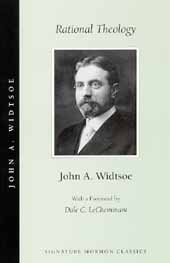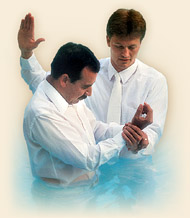 In my previous discussion of “A Rational Theology” by John Widstoe, I discussed two methodologies of deriving a full LDS theology in use during the time Widstoe was writing this book. We then compared such strategies with modern church apologists. In this installment, I’d like to discuss the first four principles and ordinances as we view them today, and contrast them with what Widstoe lays out in his rational theology.
In my previous discussion of “A Rational Theology” by John Widstoe, I discussed two methodologies of deriving a full LDS theology in use during the time Widstoe was writing this book. We then compared such strategies with modern church apologists. In this installment, I’d like to discuss the first four principles and ordinances as we view them today, and contrast them with what Widstoe lays out in his rational theology.
Article of Faith 4 reads:
We believe that the first principles and ordinances of the Gospel are: first, Faith in the Lord Jesus Christ; second, Repentance; third, Baptism by immersion for the remission of sins; fourth, Laying on of hands for the gift of the Holy Ghost.
While these verses lay out the principles/ordinances, they do little to explicate what these terms actually mean. And indeed, the confusion over these principles is the subject of many theological debates in Christianity. In Mormonism, however, I think we have some fairly clear explanations for how these principles/ordinances are used in our theology. For example, to establish a definition of faith, most Mormons will refer to Hebrews 11:1, or perhaps Alma 32:21 (not quoted for sake of brevity). Additionally, at least to me, I sense a kind of loose cultural consensus for what faith is, and is not. For baptism we can look to D&C 20:73. As for the Gift of the Holy Ghost, modern revelation confirms the method of the “laying of hand by those who are in authority,” and we have a ready explanation of the difference between the gift of the Holy Ghost, and the influence of the Holy Ghost.
I confess, I find some of the typical Mormon explanations of these principles and ordinances somewhat (okay, at least for faith very) unsatisfying. Faith, when described as “substance of things hoped for, the evidence of things not seen” leaves me wondering about the difference between God and electromagnetic waves or general relativity! In the case of Alma, it is worse because we bring a new term “knowledge” into the mix without an appropriate definition. After such standard definitions it is little wonder to me why we argue over semantics, and describe those who either fall away, or reject the church, as “faithless.” Faith often becomes the lynchpin for anyone who doesn’t see things our way!
 Likewise, even the explanation for baptism in D&C 20 leaves me wanting. What is so magical about immersion in water? Is it entirely clear from the New Testament that Jesus was “completely submersed” in the water like we believe is necessary in LDS theology? It feels like there should be more to this ordinance than simply a bath! Even coupling it with repentance (as it should be) just clouds the waters of my mind.
Likewise, even the explanation for baptism in D&C 20 leaves me wanting. What is so magical about immersion in water? Is it entirely clear from the New Testament that Jesus was “completely submersed” in the water like we believe is necessary in LDS theology? It feels like there should be more to this ordinance than simply a bath! Even coupling it with repentance (as it should be) just clouds the waters of my mind.
In “A Rational Theology,” Widstoe lays out a compelling alternative for these standard definitions. Not that he repudiates them, but he explicitly differentiates between the abstract meanings of the principles and ordinances, and the concrete implmentation on terra firma. I think his words are enlightening:
In God’s Plan for life on earth is a system of laws representing eternal realities, to which man must conform. Such a law, for instance, is faith, which, in its simple, universal meaning, is man’s certainty that in the universe is found everything he may desire for his upbuilding and advancement, and that the eternal relations of universal forces will prevail in the end for his good. Another such fundamental law, to which man must conform, is that of repentance, which in its larger sense is merely faith made active. Passive faith can do little for man’s advancement. Yet another such law is that of baptism, which is essentially obedience to existing laws. And still another such law is that of the gift of the Holy Ghost, which perhaps means that a man may place himself in touch with the whole of the universe, including the beings of superior intelligence that it contains, and draw knowledge from forces beyond the earth. – John A. Widstoe, “A Rational Theology” pp 42-43
Here, it is clear that the first four principles and ordinances of the Gospel are eternal laws, are independent of the LDS church, earth, priesthood, or any other convention, organization, or authority in the universe. I believe this offers us perspective on the larger context in which the specific LDS implementation resides. It also makes allowances for God’s other non-terrestrial children to experience different forms of these basic laws and principles.
Widstoe goes on to say:
Life on earth deals directly with gross matter and the forces pertaining to it. The laws formulated for the guidance of man are especially devised for earth conditions, and belong to the earth. For instance, water baptism, the symbol of obedience to God and acceptance of his love, is essentially an ordinance of and for this earth. It is not thinkable that water baptism is practiced in a future estate for water is an earth substance. If this be true, then all who enter upon the earth-career, and who desire the perfected joy derived from the Gospel, must have baptism on this earth. – John A. Widstoe, “A Rational Theology” pp 44-45
Then the all-encompassing explanation provided formerly, couched in the reality of earth life, offers a surprising explanation of vicarious ordinances, necessarily performed here, on behalf of those who did not receive them while “in the flesh.”
Should some of the spirits refuse, while on earth, to accept the Gospel, or fail to hear it, baptism, belonging to the earth, must be done for them, vicariously, on earth, so that they, having had the work done for them here, may accept or reject the ordinance in their life beyond the grave. This is the motive of the work for the dead. The earth ordinances must be done by or for every soul born upon the earth so that the earth-experience may not be in vain, should the Gospel be accepted in the remotest day of eternity. This view becomes more important when it is recalled that the ordinances of the earth, belonging primarily to the earth, stand for vast, eternal realities, indispensable to man’s progress. – John A. Widstoe, “A Rational Theology” p. 45
For me, I find the deeper theology here enriching, satisfying, and meaningful, particularly in my state of uncertainty with regard to the plenitude of truth claims in the LDS church.
So how do you view Widstoe’s rational “first four principles and ordinances”? Do his explanations provide you with more insight? Is he right? Or is this just another attempt by an “apologist” to justify his belief system? Is there scriptural backing for his claims? We do not emphasize such distinctions in the church today. Is this because we don’t really know, or is it just not important?

Comments 6
I only had time to skim this for now, but I recall being taught that baptism by immersion is a representation of death, burial, and spiritual rebirth as we’re made clean.
I think these touch on a fundamental truth across cultures, religions and philosophies. Man’s greatest mission is to “connect” with the universe. We obviously connect with God doing this, as the creator or the universe. But even in a philosophy that doesn’t necessarily define “God” such as Buddhism, the underlying principles are the same: to have faith that there is something bigger than us, to change what we need to in our lives keeping us from connecting with the universal, to perform certain things to bring us closer, and then, hopefully, have our connection with the universal guide us in our future decisions and relations with our fellowman.
Things that attract me to other philosophies such as Buddhism are that these are at the very core of that way of thinking. In the LDS Church, we are trapped in a crust of programs and checklists. We worry about what someone wears, what someone eats or drinks, whether someone did their home teaching, whether the doilies and decorations are just right for our lessons, etc. These are all good and well-meaning things, but the true “core” of everything is buried under so much that we lose sight of it.
I love Widstoe’s explanation of faith: “[faith] is man’s certainty that in the universe is found everything he may desire for his upbuilding and advancement, and that the eternal relations of universal forces will prevail in the end for his good.” Faith seems intricately related to optimism.
I’m no fan of apologetics. This seems to be much more than that.
Beautiful Mike S, I couldn’t agree more! We should do lunch 😉 .
I’m not sure that reality permits us to be “unconnected” in the first place. The creativity of God coopts everything — even the dead — into the magnification of complexity. (Consider what uses are made of a dead beetle on the forest floor.)
As a tradition with no theology of temple work affecting the dead, it occurs to me however that your temple work does connect the living and bring to pass refinement in the lives of the temple workers.
They are called the first principles because they are the very foundation of Mormonism. This means that if a member isn’t diligently seeking to understand and incorporate these things into their life, then they in fact, they are not in reality members of the church. Their names may appear on the church roles, but until they are actively engaged with repentance, exercising faith in the Savior, and seeking to fulfill their baptism covenant by receiving the Holy Ghost that are not really church members. The Lord put it this way:
Behold, this is my doctrine—whosoever repenteth and acometh unto me, the same is my church.
Whosoever declareth more or less than this, the same is not of me, but is against me; therefore he is not of my church.
D&C 10:67 – 68
Members come unto Christ through the first principles, there is no other way.
As Mike S. pointed out there are many ways we can get distracted. He said:
“In the LDS Church, we are trapped in a crust of programs and checklists. We worry about what someone wears, what someone eats or drinks, whether someone did their home teaching, whether the doilies and decorations are just right for our lessons, etc. These are all good and well-meaning things, but the true “core” of everything is buried under so much that we lose sight of it.”
I’ve put the first principles to the test and found them to be the means of receiving the gift of the Holy Ghost–just as advertised. There really is power in the first principles.